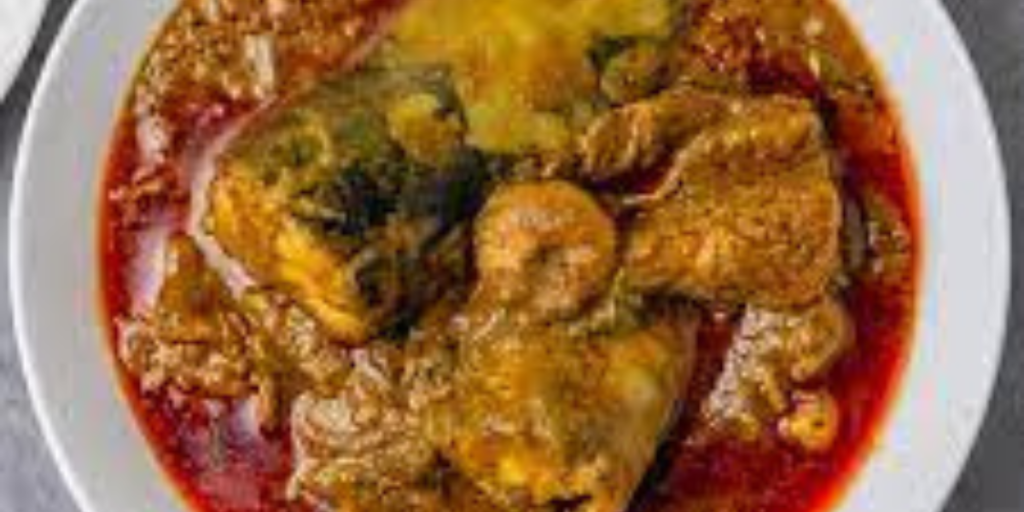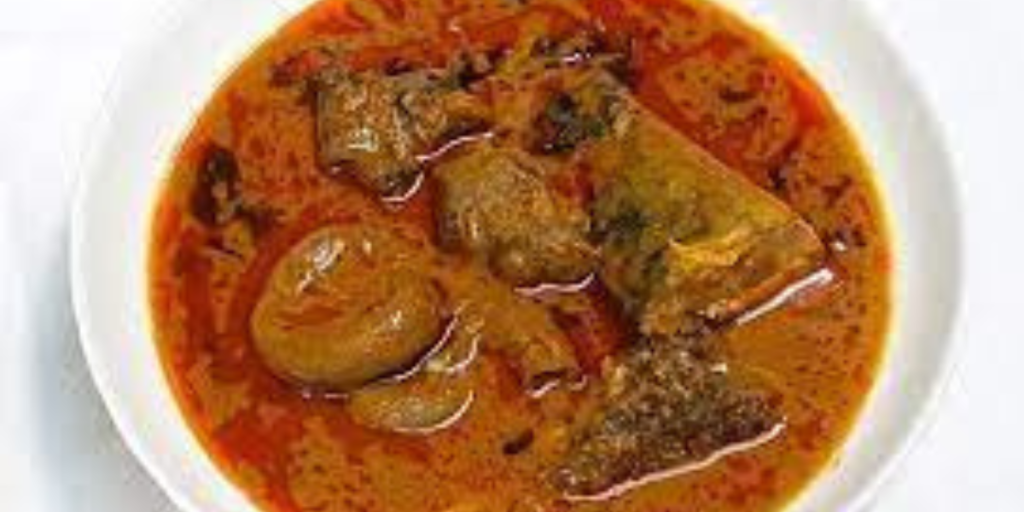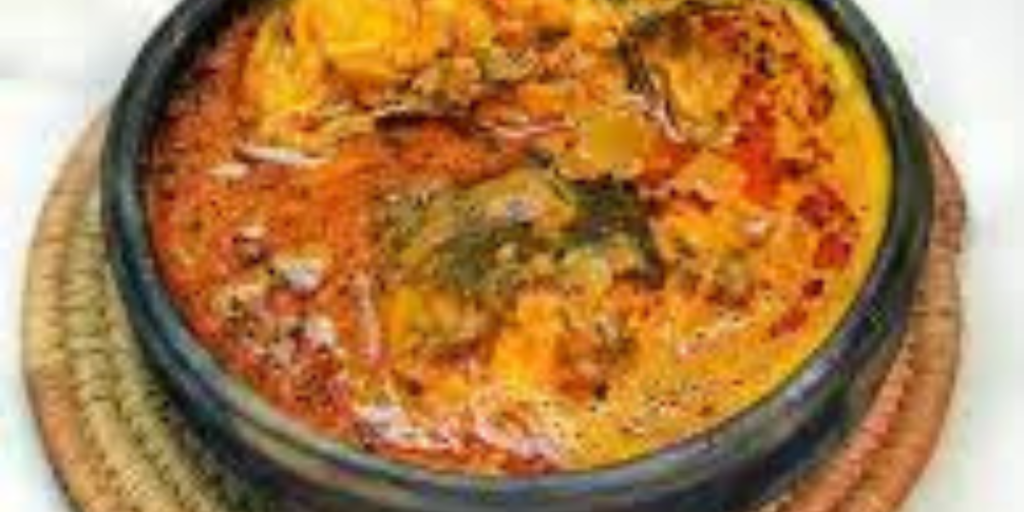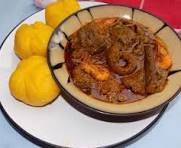Table of Contents
Banga Soup : Nigeria is a country rich in cultural diversity, and this diversity is vividly reflected in its cuisine. Among the plethora of delectable dishes that grace Nigerian tables, Banga Soup and Starch stands out as a truly iconic culinary experience. This traditional dish, deeply rooted in the Niger Delta region, is beloved for its unique flavors, rich textures, and cultural significance. In this comprehensive guide, we will delve into the history, ingredients, preparation, and cultural importance of Banga Soup and Starch, providing you with everything you need to recreate this beloved dish in your own kitchen.
How To Make Thick Banga Soup . Best of 2024
The Origins and Cultural Significance of Banga Soup and Starch

Banga Soup, also known as Ofe Akwu in Igbo, derives its name from the palm nuts used to make it. Palm nuts, or “banga,” are harvested from the oil palm tree, which is abundant in the Niger Delta region. The extraction and cooking of palm fruit extract to make Banga Soup is an age-old tradition passed down through generations.
Starch, on the other hand, is a staple accompaniment in this dish, particularly among the Urhobo and Itsekiri people of Delta State. Made from cassava, starch has a unique, slightly elastic texture that perfectly complements the rich and flavorful Banga Soup. The combination of Banga Soup and Starch is not just a meal; it is a cultural emblem that brings families and communities together.
Ingredients for Banga Soup
The key to an authentic Banga Soup lies in the ingredients. Here’s what you’ll need:
- Palm nuts (Banga): Fresh palm nuts are boiled and pounded to extract the oil-rich juice that forms the base of the soup.
- Fish and meat: A variety of fish such as catfish or dried fish, and meats like goat meat, cow tripe, or bush meat, are commonly used.
- Banga spice mix: This unique blend of spices typically includes oburunbebe stick, aidan fruit (tetrapleura tetraptera), beletete leaves, and other local spices.
- Crayfish: Ground crayfish adds a rich, umami flavor.
- Dry or smoked fish: Enhances the depth of flavor.
- Periwinkles: These are optional but add a traditional touch.
- Stock cubes and salt: For seasoning.
- Bitter leaves or scent leaves: These greens add a slight bitterness that balances the richness of the soup.
Ingredients for Starch
Starch, the traditional accompaniment, is made from cassava and requires:
- Cassava starch: This is available in local markets or African food stores.
- Water: For mixing and cooking the starch.
- Palm oil: A small amount is added to give the starch its characteristic yellow color and smooth texture.
Preparing Banga Soup
- Boil the Palm Nuts: Place the palm nuts in a pot and cover with water. Boil until the nuts are tender and the flesh can be easily squeezed off the kernel. This usually takes about 30 minutes.
- Extract the Palm Nut Juice: Drain the water and pound the nuts in a mortar until the pulp separates from the kernel. Add warm water to the pounded nuts, mix well, and strain the mixture through a sieve to extract the thick palm nut juice. Repeat this process to ensure maximum extraction.
- Cook the Base: Pour the extracted palm nut juice into a large pot and bring to a boil. Allow it to cook until it thickens slightly.
- Add the Protein: Add your choice of fish and meat to the pot. If using dried fish or stockfish, soak them in hot water first to soften them. Add the crayfish, banga spice mix, and other seasonings.
- Simmer: Reduce the heat and let the soup simmer until the meat and fish are cooked through. This can take anywhere from 45 minutes to an hour, depending on the types and sizes of the proteins used.
- Final Touches: Add the periwinkles, if using, and the bitter leaves or scent leaves. Adjust seasoning with stock cubes and salt to taste. Let the soup simmer for another 10-15 minutes to allow the flavors to meld together.
Banga soup ingredients list Best of 2024
Preparing Starch
- Mix the Starch: In a bowl, mix the cassava starch with a small amount of water to form a smooth paste.
- Cook the Starch: Pour the starch paste into a pot and add water gradually while stirring constantly to avoid lumps. Continue stirring over medium heat until the mixture thickens and becomes translucent.
- Add Palm Oil: Add a small amount of palm oil to the cooked starch and mix well. This gives the starch its distinctive yellow color and smooth texture.
- Serve: Shape the starch into small balls and serve alongside the Banga Soup.
Serving and Enjoying Banga Soup and Starch

Banga Soup and Starch is typically enjoyed with the hands, as is customary in many Nigerian dining traditions. The starch is used to scoop up the rich, flavorful soup, creating a harmonious blend of textures and flavors in every bite. This dish is often served at family gatherings, celebrations, and special occasions, where it brings people together to share in the joy of good food and good company.
Health Benefits and Nutritional Value
Banga Soup and Starch is not only delicious but also nutritious. Palm nut juice is rich in vitamins A and E, which are important for eye health and immune function. The inclusion of various fish and meats provides a good source of protein, while the greens add essential vitamins and minerals. Cassava starch is a good source of carbohydrates, providing the energy needed to fuel your day.
How To Make Banga Soup With Fresh Fish in 2024
Tips and Tricks for Perfect Banga Soup and Starch
- Fresh Ingredients: Use fresh palm nuts and high-quality fish and meat for the best flavor.
- Balanced Seasoning: Be careful with the seasoning, especially salt and stock cubes. The banga spice mix is potent, so taste as you go.
- Consistency: The thickness of the palm nut juice affects the final texture of the soup. If it’s too thin, the soup will be watery; if too thick, it might be too rich. Aim for a balanced consistency.
- Proper Cooking Time: Ensure the proteins are cooked through and tender. Overcooked fish can become mushy, while undercooked meat can be tough.
- Starch Preparation: The key to smooth starch is constant stirring and gradual water addition to avoid lumps.
Frequently Asked Questions
- Can I use canned palm nut concentrate instead of fresh palm nuts?
- Yes, canned palm nut concentrate can be used as a convenient alternative. Follow the instructions on the can for dilution and use it as you would the fresh extract.
- What can I use if I can’t find Banga spice mix?
- If Banga spice mix is unavailable, you can create a substitute using ground crayfish, dried bitter leaves, and a blend of local spices like nutmeg and cloves. However, the authentic flavor may be slightly different.
- Can I make Banga Soup ahead of time?
- Yes, Banga Soup can be made ahead of time and stored in the refrigerator for up to 3 days or frozen for longer storage. Reheat gently before serving.
- Is Starch the only accompaniment for Banga Soup?
- While starch is traditional, Banga Soup can also be enjoyed with other sides like pounded yam, eba (garri), or rice.
- How do I handle the palm nuts safely?
- Allow the boiled palm nuts to cool slightly before pounding to avoid burns. Use a sturdy mortar and pestle to extract the juice efficiently.
Banga soup :What Can Be Used To Thicken Your Banga
Conclusion

Banga Soup and Starch is a culinary masterpiece that showcases the richness of Nigerian cuisine. This dish, with its complex flavors and cultural significance, is a testament to the culinary heritage of the Niger Delta region. Whether you are a seasoned cook or new to Nigerian cuisine, preparing Banga Soup and Starch is a rewarding experience that will bring a taste of Nigeria to your table. So gather your ingredients, follow the steps, and enjoy the delightful journey of making and savoring Banga Soup and Starch. Happy cooking!
By embracing the tradition of Banga Soup and Starch, you not only create a delicious meal but also connect with a rich cultural history that spans generations. This dish is more than just food; it is a celebration of community, heritage, and the joy of sharing a meal with loved ones. Enjoy the process, savor the flavors, and celebrate the vibrant culinary traditions of Nigeria.






















